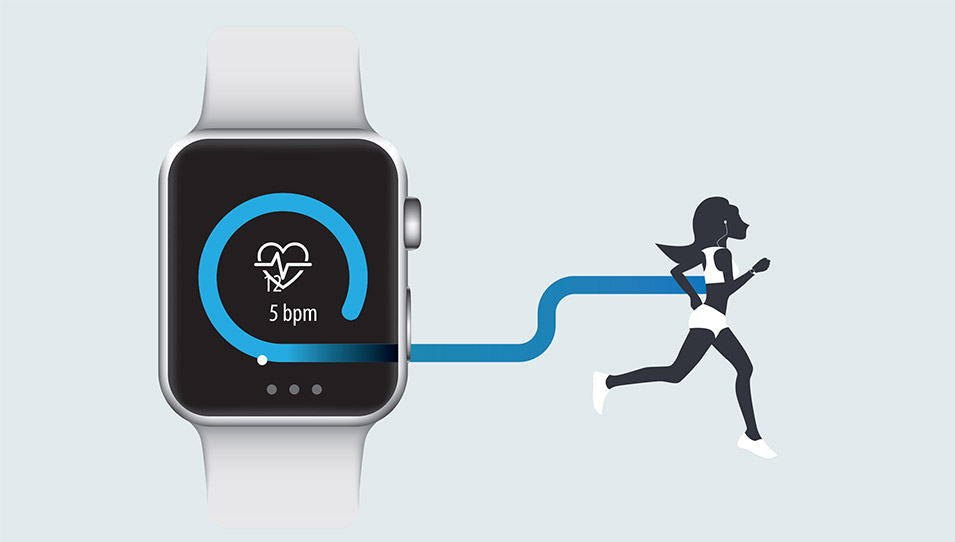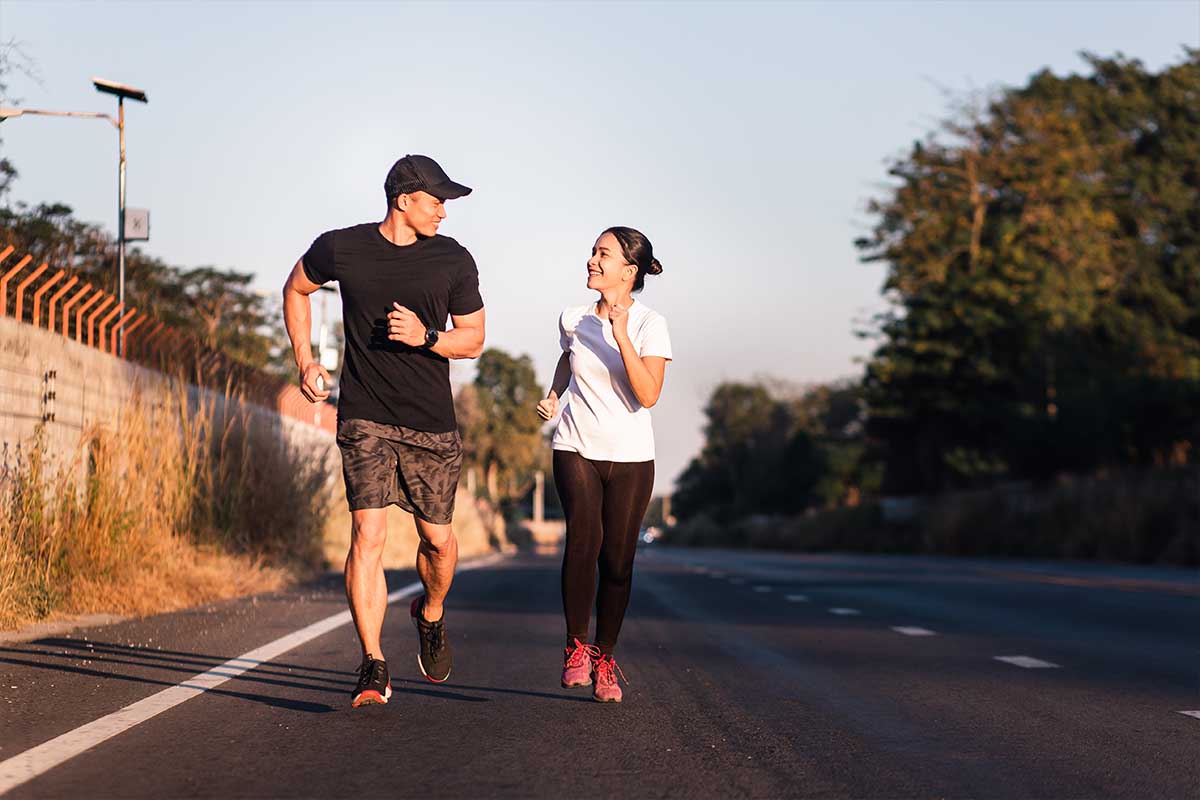Advertisement
Fitness Tech
Get the most out of your workouts

Undoubtedly, you’ve heard the catch phrase, “work smart, not hard.” The reality of fitness is that hard work gets results, and you get out what you put in. The latest in wearable fitness technology, however, can help ensure that you get the greatest possible return on your investment.
Advertisement
High tech for every body
Heart rate monitors, watches, apps, thermal suits, sweat-wicking materials, anti-odour agents—you can literally be covered from head to toe in wearable fitness technology.
A professional trainer of 13 years, Nick Middleton, CPT, notes that “it wasn’t all that long ago exercisers had to go to advanced training facilities to have access to biometrics equipment. This type of testing was expensive and not always accessible to the general public; [it was] often reserved for professional athletes. Today, there is a plethora of devices that connect wirelessly to our personal handheld devices or serve as stand-alone devices yielding valuable information about our personal biometrics.”
Advertisement
Track your workouts
You cannot improve on what you do not measure. Both hardware and software are available to track your workouts, as well as your progress.
Pick of the crop
Three devices rise above the rest when it comes to wearable workout tracking: Apple Watch, Fitbit Surge, and Jawbone UP3.
The Apple Watch, Fitbit Surge, and Jawbone UP3 interact with your smartphone. The Apple Watch also acts as a phone, a mini-computer, and, oh yeah, it tells time (unlike the Jawbone UP3). It’s the best looking of the wearable fitness devices, but it’s also the most expensive.
What they do
As a fitness tool, the devices track your movements in the same manner as other wearable devices:
- an accelerometer (tracks intensity)
- a gyroscope (tracks movement)
- a heart rate monitor
Each of these products comes with its own downloadable app that tracks your activity levels, your workouts, your nutrition, and even your sleep patterns. Oddly enough, the Apple Watch, which has the capacity and instruments to track your sleep, does not provide this in its app.
The Watch and Fitbit also have a unique feature that can track your runs with internal GPS. All three products’ apps provide an easy to navigate, intuitive user experience. They’re fun to use, making it feel like tracking every aspect of your health is a game.
Advertisement
Measure your engagement
A quote often attributed to Albert Einstein defines insanity as doing the same thing over and over again and expecting different results. In fitness, we call this wasting your time; not as eloquent, but equally fitting.
The human body has overactive muscles that like to do all of the work (such as the trapezius muscles in the back of your neck) and lazy muscles that don’t like to do any of the work (such as your gluteus maximus). Before giving an exercise to my clients to perform, I always tell them what muscle we’re targeting and where they should feel the exertion. But contrary to popular advice, you may no longer need to “shake up your routine.”
Form-correcting clothing
A company called Athos manufactures clothing that “shows you exactly what muscles are firing, how intensely, and in what sequence, so you can correct your form immediately.” The app has an attractive user experience with real-time feedback on your mobile device. This product could be extremely useful for testing muscular activation, sequencing, and magnitude, and could prove to be a critical assessment tool for professional trainers, athletes, and exercisers alike. You can purchase the compression shirt, shorts, and relay unit.
Advertisement
Supercharge your routine
Run to your own rhythm
Do you need a personal trainer or motivator but don’t have the money? Not only are there free apps out there to encourage you to get moving (for example, FitStar Personal Trainer, Nike+ Training Club, and Sworkit), but there are apps that you can install on your smartphone or MP3 player that actually sense your pace during a run, and choose music for you to help you maintain it. Cruise Control (iOS), RockMyRun (iOS and Android), and PaceDJ (iOS and Android) are all free apps that match music to your tempo so you can keep in stride.
Get pumped up before the game
Music and mood matching apps are not just for running. Professional baseball player and starting pitcher for the Québec Capitales, Mark Hardy, relies on fitness tech to get him mentally prepared before he plays. “For every start, I have to listen to my pump-up playlist to get me ready,” Hardy says. “If I forgot my headphones and phone before a game, I don’t know what I’d do.” Many professional athletes and weekend warriors alike rely on music to move their muscles.
Advertisement
Personality types and tech choices
A 2014 review of personality types examined locus of control, and how it influences stress and conflict management. Researchers can potentially predict how Type A and Type B exercisers may react to and utilize different wearable fitness tech.
Type A personality
People with Type A personality are ambitious, rigidly organized, highly status conscious, impatient, anxious, proactive, and time management-centric. People with Type A personality are often high achievers and multitaskers who push themselves with deadlines.
Type B personality
Those with Type B personality are often a stark contrast to Type As. Type B personalities live at lower stress levels. They typically work steadily and enjoy achievement, but they don’t experience the same emotional distress as Type As when they don’t achieve their goals. When faced with competition, Type Bs don’t focus on losing; they perceive enjoyment independent of winning or losing.
Choosing a suitable tech option
Keeping these stereotypes in mind, Type A personalities should gravitate toward technology that tracks their workouts on many levels. Goal setting and achievement should be the focus of their training.
Type Bs may want to focus on the tech gear that enhances their enjoyment of the workout, for greater adherence.
Wearable fitness tech is a rapidly growing industry and can re-energize your commitment to health, but, as Middleton reminds us, “At the end of the day, using tools to improve training intensity, motivation, or structure are excellent, but you’ve still got to do the work!”
Advertisement
Stay motivated!
Once the excitement of the new equipment wears off, it’s important to keep up your motivation. You may want to join the Apple, Fitbit, or Jawbone online community for mutual motivation, or set goals and targets to reach each day and reward yourself accordingly.





